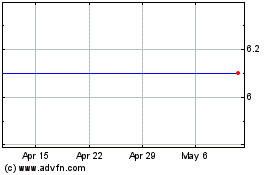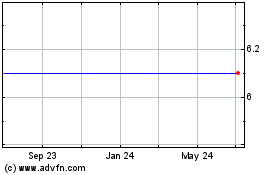By Christina Rexrode in New York and Jeannette Neumann in Madrid
Big American and European banks with substantial interests in
Mexico are standing fast with plans for further investment in that
country even as trade-war talk heats up with the U.S.
Citigroup Inc. and Spain's Banco Santander SA and Banco Bilbao
Vizcaya Argentaria SA said they remain confident in their
businesses in Mexico, where they control the country's top three
banks. Executives have also said in recent days that while a trade
war could hurt Mexico's economy, further peso weakness could make
the country even more competitive globally.
"Mexico does have a lot of advantages, and those advantages as
an economy would continue no matter what would happen between trade
with the U.S.," Citigroup finance chief John Gerspach said Thursday
during a call with debt investors. "A weakening peso would again
give them even more of a competitive edge."
Citigroup owns one of Mexico's biggest banks, known as
Citibanamex, and a month before the U.S. election said it planned
to invest $1 billion in the country over four years to improve and
refurbish operations. "We're on pace to keep that going," Mr.
Gerspach said of Citibanamex, which generated about 15% of
Citigroup's consumer revenue in the fourth quarter.
Speaking after Santander reported fourth-quarter results
Wednesday, Executive Chairman Ana Botín said the bank still plans
to move ahead with a 15 billion peso investment announced in
December to modernize bank branches, ATMs and information
technology systems during the next three years. Santander owns
another of Mexico's largest banks and generates about a tenth of
its net profit in that country.
"We expect to continue to do well in Mexico despite a more
challenging environment," Ms. Botín said.
BBVA, which owns Mexico's largest bank, BBVA Bancomer SA, has
more at stake, generating about half its net income in the
country.
"In the short term, Mexico will have to cope with great
challenges, but Mexico will overcome the current situation," BBVA
Chairman Francisco González told The Wall Street Journal in a
statement. "Gradually policies should evolve in the right
direction" between Mexico and the U.S., he added.
For their part, investors are showing some concern but aren't
selling indiscriminately. Citigroup shares have outperformed the
S&P 500 since the U.S. election but have trailed the KBW Nasdaq
Bank index by about 10 percentage points.
BBVA shares have lost nearly 2% since the election versus a
nearly 18% gain for the Euro Stoxx Banks index. Meanwhile,
Santander stock has actually outpaced the index, rising about 21%
since Nov. 8.
The growing war of words between President Donald Trump and
Mexico has taken a toll on the peso -- it has lost about 14% of
value against the dollar since Nov. 8 -- and raises the prospect of
an economic slowdown or even recession in that country.
Given all three foreign banks' operations are focused primarily
on retail and commercial banking, the lenders' profits in Mexico
are closely tied to domestic demand for mortgages, consumer and
business loans. And while a weaker peso could increase
competitiveness, it poses a short-term headwind for the banks.
Fourth-quarter net profit at Santander's Mexico business rose
14% from a year earlier measured in pesos. But for purposes of the
bank as a whole, it fell 2.3% when translated back into euros. BBVA
reports fourth-quarter results Wednesday.
Santander and BBVA executives say confidence in their ability to
juggle the uncertainty in Mexico derives in part from experience
managing businesses in other emerging markets. Santander has a
major bank in Brazil and BBVA in Turkey.
Citigroup also has a long history in emerging markets. Speaking
on his bank's earnings call earlier this month, Chief Executive
Michael Corbat noted Citigroup has served customers around the
world "through wars, through trade wars, through depressions,
through recessions."
Still, Mexico could prove disruptive for Citigroup if, say,
President Trump opts to abandon the North American Free Trade
Agreement. Some investors and analysts have in the past called on
the bank to sell the Mexico operations, which were rocked by a
loan-loss scandal in 2014. Scrapping Nafta, or a severe recession
in Mexico, could rekindle such debate.
For now, the bank isn't changing course. Asked on Citigroup's
earnings call if the bank would consider selling the Mexico
business, Mr. Gerspach replied: "No. That's not even on the table."
And Citigroup directors spent only a few minutes discussing Mexico
at a board meeting in recent days, according to people familiar
with the matter.
How the Mexico-U.S. trade dispute plays out, especially as it
relates to the country's economy and remittances to people living
there, will prove important to Citigroup and its growth
prospects.
About 24% of Citibanamex's corporate loans are to companies in
Mexican states along the U.S. border, which presumably would be
most hurt by a more restrictive trade policy, Goldman Sachs
analysts estimate based on data from Mexico bank regulators. As
well, Mexico accounts for, on average, 10% of Citigroup's revenue
from continuing operations, more than any market except the
U.S.
Citibanamex also hosts more than 27 million consumer accounts,
about half of Citigroup's total and more than two and a half times
the bank's number of U.S. ones.
Of course, U.S.-Mexico relations could improve. And some bankers
even think the current situation could lead to opportunity, should
Nafta be revisited or renegotiated. Jorge Mariscal, emerging market
chief investment officer at UBS Wealth Management, said there are a
number of banking issues that Nafta doesn't address, but that have
been sore points for years.
For example, a new treaty could allow Mexican collateral to be
used for U.S. dollar loans or make it easier for banks to have
cross-border banking licenses, he said.
"The rhetoric is quite concerning," Mr. Mariscal added. "It's
not clear if there is a constructive road ahead. But if there is,
there is both risk and opportunity."
Telis Demos contributed to this article.
Write to Christina Rexrode at christina.rexrode@wsj.com and
Jeannette Neumann at jeannette.neumann@wsj.com
(END) Dow Jones Newswires
January 28, 2017 07:14 ET (12:14 GMT)
Copyright (c) 2017 Dow Jones & Company, Inc.
Banco Santander (NYSE:STD)
Historical Stock Chart
From Mar 2024 to Apr 2024

Banco Santander (NYSE:STD)
Historical Stock Chart
From Apr 2023 to Apr 2024
